For parents, it’s inevitable to worry about your baby, especially if your little one has diarrhea.
It useless to be anxious about it, and so, the first step is to distinguish if the poop is normal for babies or if it is indeed diarrhea. Babies have soft poop due to breast milk intake, and after feeding, they are likely to expel it. The whole feeding-pooping cycle will only alter if you change the food they’re eating like transitioning from liquid milk or soft food to eating substantial meals. The soft poop will firm due to that.
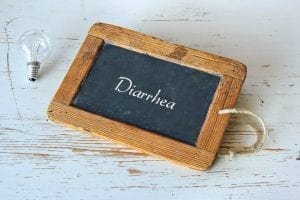
The poop of babies is usually loose and soft. They are likely to poop after feeding too. Once their bowel movement changes like they are pooping more often and their stool is becoming very watery, then, there is a big chance that your baby is experiencing diarrhea.
Diarrhea is not usually a threat unless the baby becomes dehydrated or diarrhea becomes severe. So make sure that your baby is drinking lots of fluids.
Causes Of Diarrhea On Babies And Toddlers
There are lots of possible reasons or causes for baby diarrhea and young children like viral and bacterial infections, parasites, antibiotics, or food poisoning. That is why it is imperative to clean your hands thoroughly with antibacterial soap before giving out a bottled formula to your babies. The bacteria or virus from your hands may transmit through the bottle and harm your baby.
Viral Infection
Viruses like influenza and rotavirus are harmful to your baby and may activate loose bowel movement. The baby will also vomit, have a fever and other unwell baby symptoms. Virus infections sometimes also cause baby diarrhea.

Bacterial Infection
Another factor that could cause diarrhea is a bacterial infection. Bacteria like salmonella and E. coli are some of the infamous ones that could make your baby’s stool looser than usual.
Some infections go away on their own, but E. coli, which are present in food like undercooked meat, have very severe effects. Make sure to take your baby to the specialist for proper laboratory testing and diagnosis.
Ear Infection
If your baby is somehow fussy along with his diarrhea, you can check with the pediatrician if he has an ear infection. Ear infection in babies and toddlers can also cause diarrhea.
Parasites
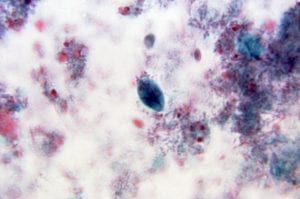
Parasites like Giardiasis can also give your baby diarrhea. But beware because this type of infection has to be treated since it can quickly spread to others.
Antibiotics
Your baby can also get diarrhea after taking medicine like antibiotics. Antibiotics are to suppress harmful bacteria, but it can even kill the good bacteria in the intestine. Despite this, don’t stop giving your baby antibiotics since it’s the doctor’s prescription. Inform the pediatrician about your baby’s loose stool.
Juice Overload
Your baby may also have an upset stomach and suffer from diarrhea due to the high amounts of fructose and sorbitol from juices. Reduce the amount of juice consumption, and ideally, don’t give the baby juice until he is one year old. If you don’t mix the formula correctly, your baby can also get diarrhea from it.
Food Allergies
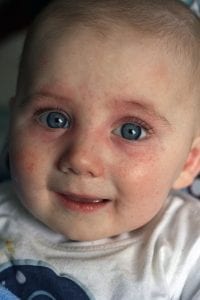
The baby might have an allergy to a specific food ingredient. You will know by then if he suffers from diarrhea. If your baby is experiencing other symptoms like difficulty in breathing and swelling of the face and rashes, contact 911 or your doctor immediately. It is essential to be aware of allergies to prevent getting baby diarrhea.
Your baby could also be allergic to milk protein, although he really shouldn’t be drinking cow’s milk until one year old. Possible foods a baby may be allergic to are eggs, soy, and peanuts. Consult your doctor about it to know more.
Food Intolerance
Food intolerance is different from food allergy as it doesn’t include the immune system, and instead, it’s an irregular reaction.
A well-known kind of food intolerance is lactose intolerance though it doesn’t often happen in babies. If your young one is lactose intolerant, it suggests that his body doesn’t have enough lactase to digest lactose. Lactose is present in cow’s milk. If lactose remains undigested, it can trigger diarrhea, along with other symptoms.
Severe cases of diarrhea can also lead to difficulty in producing lactase. With that, the baby may become lactose intolerant for one to two weeks. If it persists, consult with your pediatrician.
Poison Ingestion
Immediately contact the Poison Control Center or 911 if you think your baby’s vomiting and diarrhea are caused by ingesting something that isn’t food. Parents should be cautious when giving children food, especially that they are young and susceptible to baby diarrhea.
Treating Baby Diarrhea
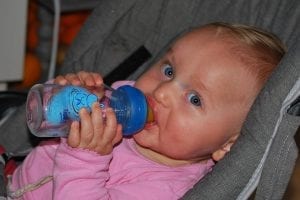
Keep your baby hydrated. Diarrhea is often not something to worry about too much, primarily when you treat it appropriately. Avoid making it severe by keeping your baby dehydrated.
Your doctor might recommend your baby to consume a pediatric electrolyte solution. It is available in drug stores, that is, if your baby can’t keep on pooping.
Resist sugary drinks or food. Don’t give your baby sweetened beverages like juice or something sweet. It can make your baby’s diarrhea worse as it draws water to the intestine.
Always provide well-balanced meals for your baby. If your baby is eating solid foods, continue feeding him his meals even if he has diarrhea. Give your baby a balanced diet with BRAT or Bananas, Rice, Applesauce, and dry Toast. He would need all the nutrients to fight off diarrhea.
Don’t worry too much if your baby doesn’t eat. Just keep him hydrated, and he’ll be back to healthy eating and pooping cycle soon.
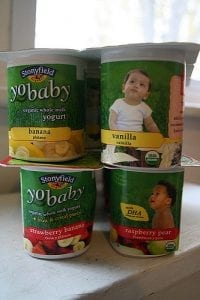
Feed your baby yogurt. Yogurt has live bacteria cultures that can help with diarrhea. Give your toddler plain and unsweetened yogurt to eat, especially if he’s already eating solid food.
Make nappy changes frequent. It’s easy for their bottom to become red and irritated due to the constant pooping, so change it often to avoid more problems.
Cuddle. Cuddle your baby or toddler as often as you can to comfort him. The act of cuddling can provide a feeling of security and comfort for your child. It can ease his discomfort with diarrhea.
Can I Give My Baby Some Adult Anti-diarrhea Meds?
DO NOT SELF-MEDICATE OR GIVE MEDICINE TO YOUR CHILD WITHOUT THE DOCTOR’S PRESCRIPTION. If the diarrhea is mild, the pediatrician will not prescribe an anti-diarrhea medicine.
When To Contact A Pediatrician For My Baby’s Diarrhea
If your baby is younger than three months old or younger, that will warrant an immediate call to the doctor if they have diarrhea. If they’re older than three months, wait for a day, and if their condition hasn’t improved, bring him to your doctor.
If your baby has symptoms, go to the pediatrician immediately:
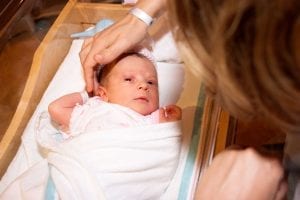
- Frequent vomiting
- Signs of dehydration like dry mouth, a dry diaper for 6 hours or more, and tearless crying
- Bloody, dark or black stool
- High fever-like 101 degrees Fahrenheit or 38.3 degrees Celsius if your baby is 3-6 months old, or 103 degrees F or 39.4 degrees C if they’re around six months or older.
How Can I Protect My Baby From Infectious Diarrhea
Wash your hands often to avoid getting microorganisms that can be transferred from hand to mouth and cause diarrhea. If you’re changing the baby’s diaper, you can also get organisms from that, so clean up first before touching your baby. He can also get diarrhea by putting random objects into his mouth that might have bacteria, viruses, or parasites. Don’t leave behind things within his reach.

You should wash your hands thoroughly after changing diapers and before cooking or handling food. Your baby’s hands should also be cleaned and sanitized.
Frequently Asked Questions On Baby Diarrhea
Last Updated on January 11, 2023 by Rejie Salazar
DISCLAIMER (IMPORTANT): This information (including all text, images, audio, or other formats on FamilyHype.com) is not intended to be a substitute for informed professional advice, diagnosis, endorsement or treatment. You should not take any action or avoid taking action without consulting a qualified professional. Always seek the advice of your physician or other qualified health provider with any questions about medical conditions. Do not disregard professional medical advice or delay seeking advice or treatment because of something you have read here a FamilyHype.com.